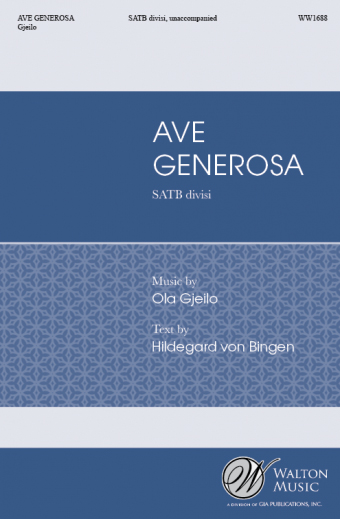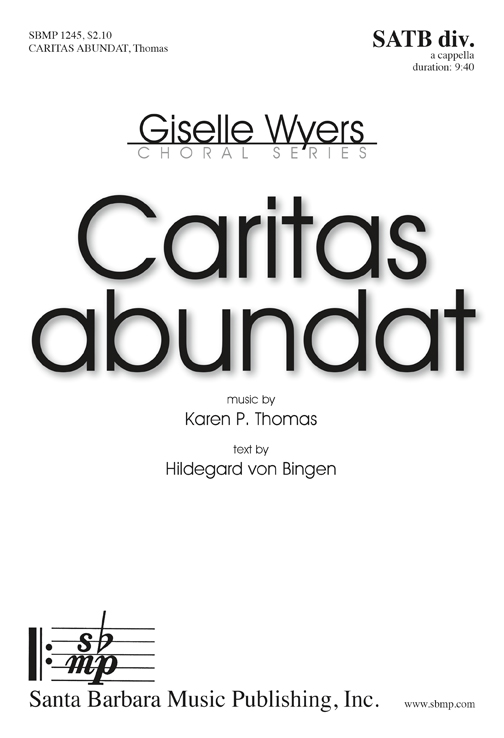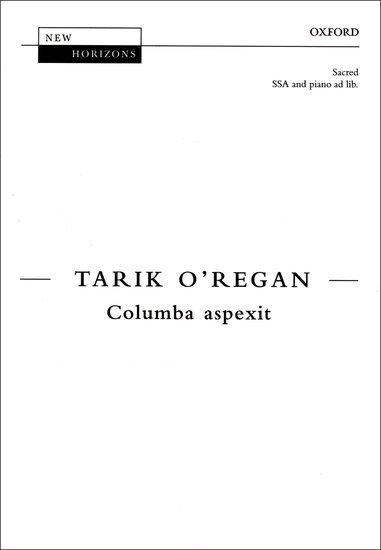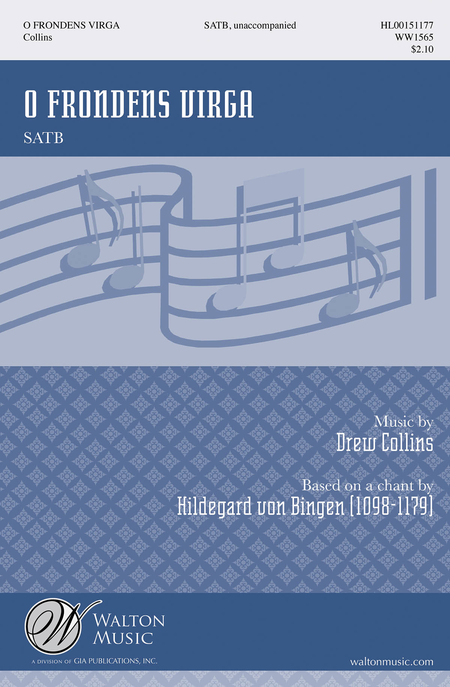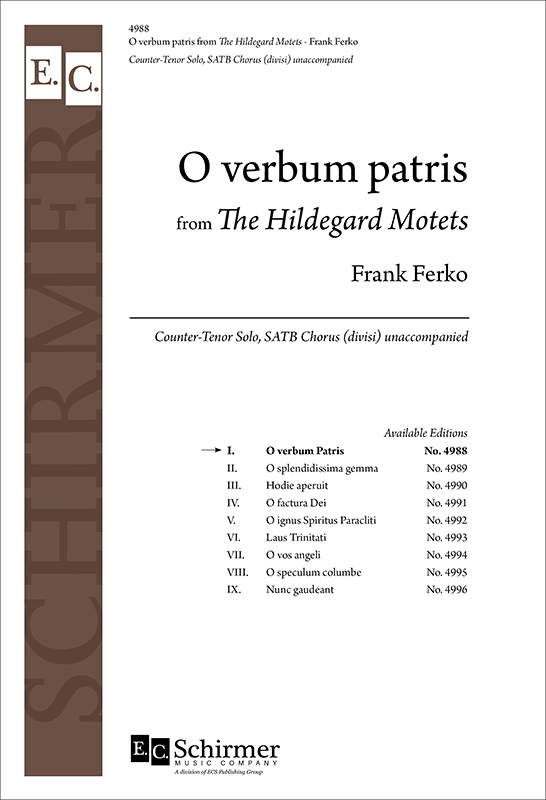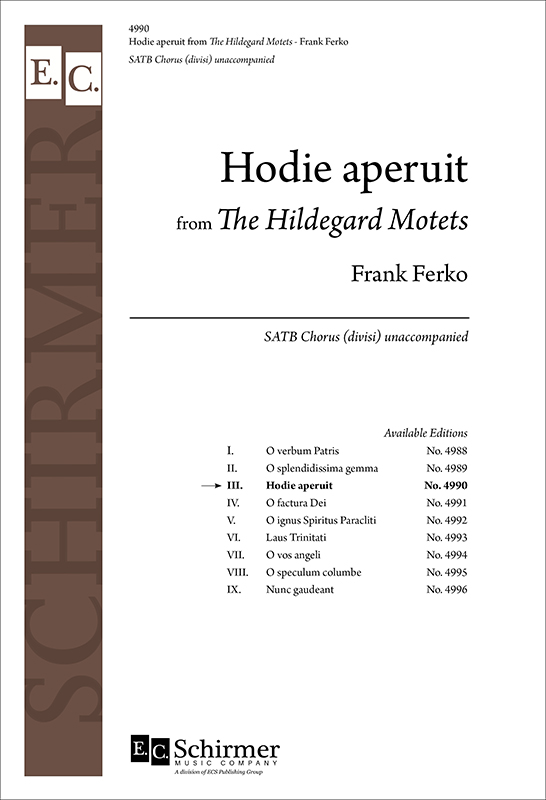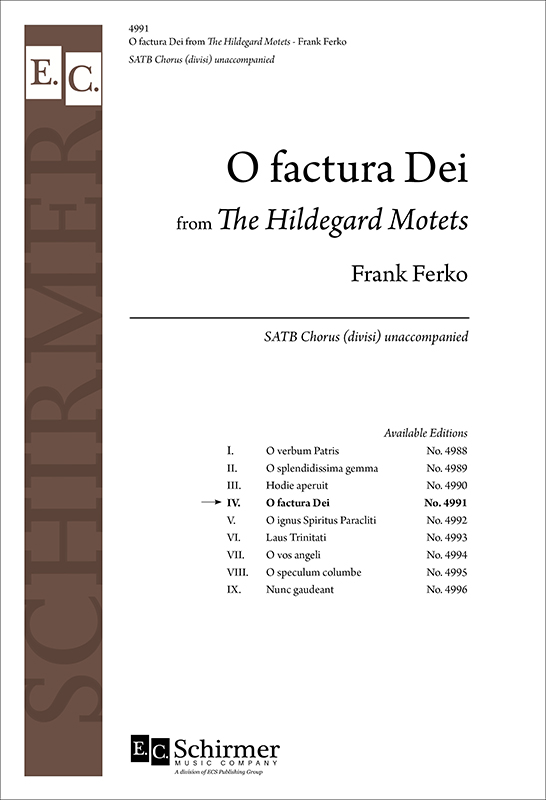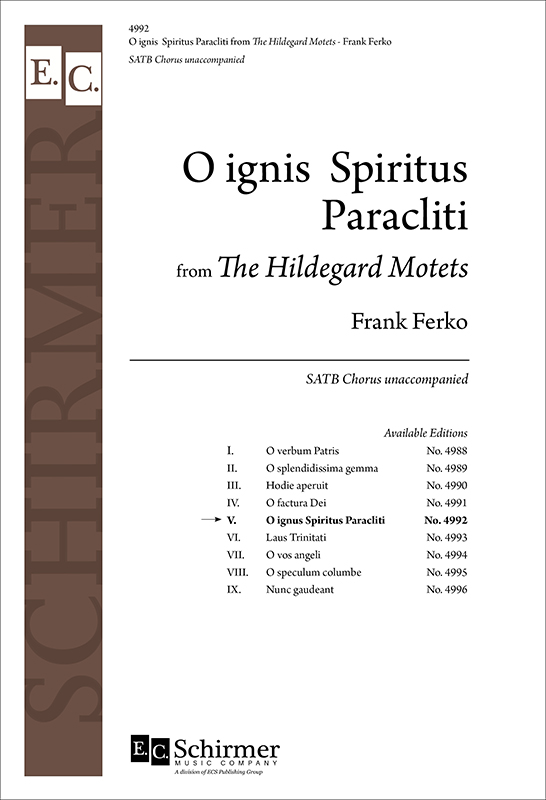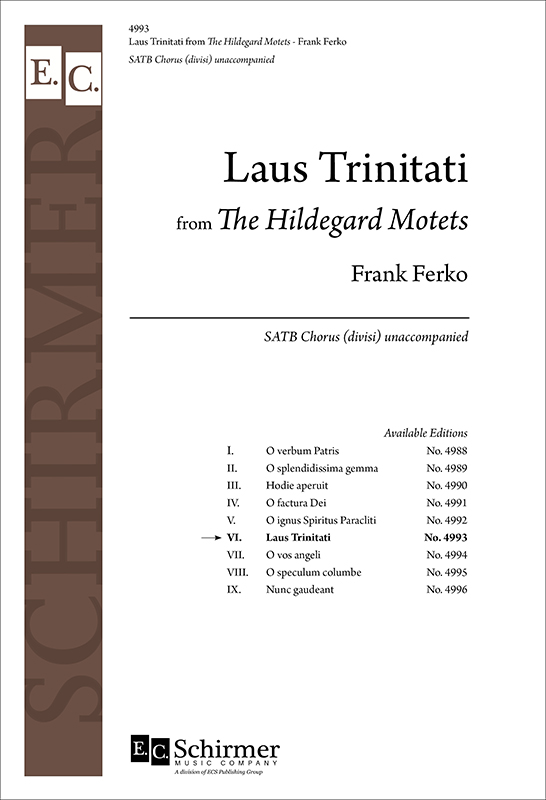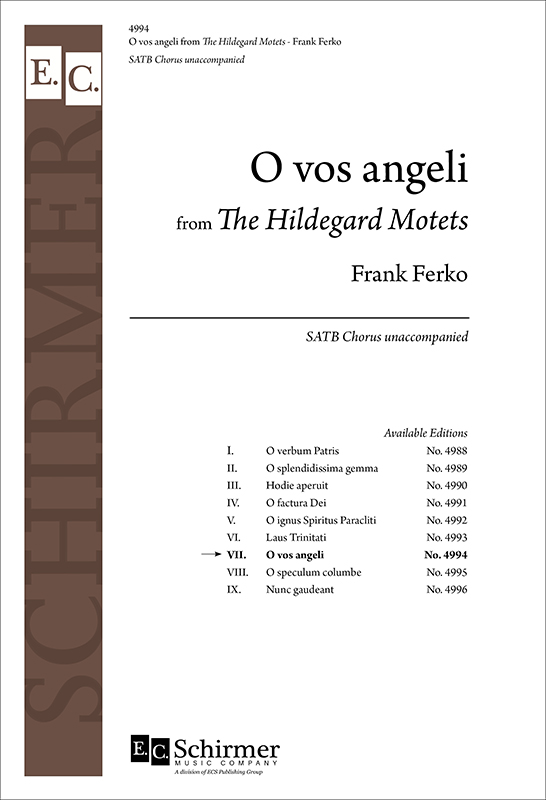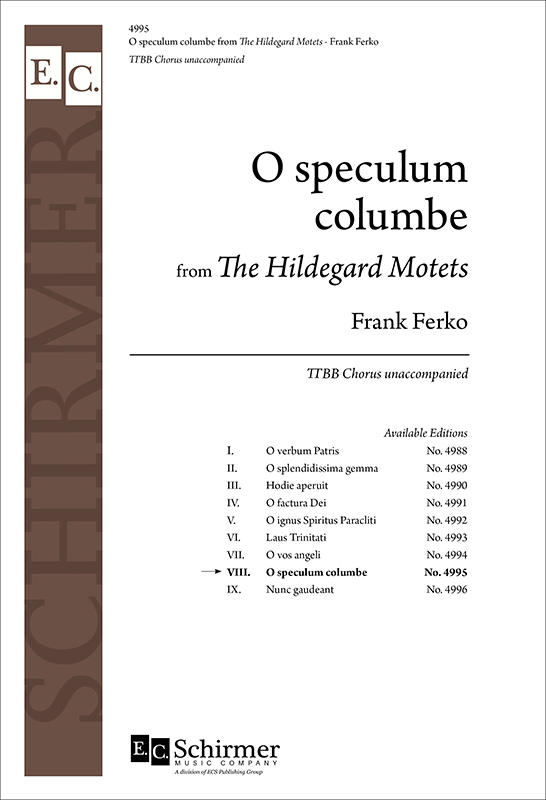In Celebration of the Human Voice - The Essential Musical Instrument
Home | Doo Wop | Barbershop | World | Contemporary | Christian | Vocal Jazz | Choral | Christmas | Instructional | Arrangements
Classical | Opera | Musicals | Personality | Young Singers | Disney | Videos | Songs | The Artists

Hildegard von Bingen
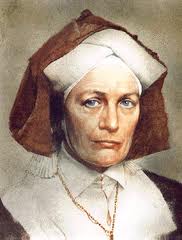
Hildegard of Bingen began having visions as a child, but it wasn't until she was in her forties that her revelations in Christianity made her turn to composing. She founded convents and wrote plays, liturgies and hymns in praise of saints. Incredibly prolific, she was also considered a healer and early theologian and she was venerated in the church. Her compositions continue to be performed and recorded today. |
Arrangements | Recordings
Displaying 1-18 of 18 items.
This SATB setting of Hildegard von Bingen's Ave Generosa text uses a hauntingly joyful tonality, paying homage to the mysterious story of Mary. A beautiful middle section is surrounded by contrasting, modal beginning and ending sections. The juxtaposition of sustained and moving moments holds true to the composer's style, while the harmonic structure and vocal construction offer something very fresh.
Arranger: Ola Gjielo Performed By: Kantorei Denver
Many people will be familiar with the beautiful music of Hildegard von Bingen. Here O'Regan has woven a mesmerising and inventive homage to Bingen's twelfth-century sequence. A fantastic showcase for any confident upper-voice group.
Arranger: Tarik O'Regan
The green movement seems so contemporary, it comes as a shock to find the words of this music were written by Hildegard von Bingen of the 12th century. Kirke Mechem has created a round that cleverly employs an unending circle-of-fifths progression to capture the never stopping reality of the round. Commissioned by the Peninsula Women's Chorus, Martin Benvenuto, Artistic Director. Duration: Ca. 4 minutes 30 seconds
Arranger: Kirke Mechem
Winner of the 2004 Emerging Composer Competition awarded by the Yale Glee Club, this work is a setting of the Latin antiphon by Hildegard von Bingen. Alternating between joy and reflection, this buoyant work will be a concert showpiece.
Arranger: Jocelyn Hagen
This thrilling work for women's chorus from Michael Engelhardt will offer something totally unique for your program. A mix of sustained vocal lines and articulated passages along with both counterpuntal and homophonic writing make this a truly remarkable composition. This will be a favorite of your singers. Recording Choir: Pacific Lutheran University Singers; Brian Galante, conductor
Arranger: Michael Engelhardt
For more ambitious choirs who would like to emulate the sound of Anonymous 4, this pieces uses chant-like singing and beautiful polyphonic vocal writing that emphasizes the purity of the voice through the evocative Latin text by Hildegard von Bingen.
Written for the Wheaton College Christmas Festival, this work with a text by Christian mystic, Hildegard of Bingen, should feel very free, personal and almost improvisational. The close harmony requires careful attention to balance among the parts and is worthy of any fine women's choir.
Arranger: Lee Kesselman
This is a bold reimagining of Hildegard's chant, both tune and text. Actively quoting the source material, DiOrio's setting takes Hildegard's music as a launching point from which to imagine new sonic possibilities. This piece is meant to be experienced in the round, as the voices surround the audience and attempt to create an enactment of Hildegard's visions. Duration: ca. 5 minutes.
Arranger: Dominick DiOrio
The Hildegard Motets comprise a cycle of nine unaccompanied choral motets using texts by the 12th century abbess Hildegard von Bingen (1098-1179). The texts were extracted from Hildegard's opus of more than seventy sacred poems titled Symphinia armonie celestium revelationum. Although these poems have been translated into English (more than once) and some of the translations are quite brilliant, I chose to set the original Latin texts as I felt they remained closer to Hildegard's own thoughts. The nine poems used in this cycle were selected according to their appropriateness to seasons in the Christian liturgical caldendar (thus, most of them can be sung in specific liturgical settings) and to their appropriateness to the structured plan of this cycle as well as for their sheer poetic beauty. Hildegard's poetic vocabulary was unusual and unique; she frequently used language that is not found in standard Latin liturgical texts. As with the music sh
Arranger: Frank Ferko
The Hildegard Motets comprise a cycle of nine unaccompanied choral motets using texts by the 12th century abbess Hildegard von Bingen (1098-1179). The texts were extracted from Hildegard's opus of more than seventy sacred poems titled Symphinia armonie celestium revelationum. Although these poems have been translated into English (more than once) and some of the translations are quite brilliant, I chose to set the original Latin texts as I felt they remained closer to Hildegard's own thoughts. The nine poems used in this cycle were selected according to their appropriateness to seasons in the Christian liturgical caldendar (thus, most of them can be sung in specific liturgical settings) and to their appropriateness to the structured plan of this cycle as well as for their sheer poetic beauty. Hildegard's poetic vocabulary was unusual and unique; she frequently used language that is not found in standard Latin liturgical texts. As with the musi
Arranger: Frank Ferko
The Hildegard Motets comprise a cycle of nine unaccompanied choral motets using texts by the 12th century abbess Hildegard von Bingen (1098-1179). The texts were extracted from Hildegard's opus of more than seventy sacred poems titled Symphinia armonie celestium revelationum. Although these poems have been translated into English (more than once) and some of the translations are quite brilliant, I chose to set the original Latin texts as I felt they remained closer to Hildegard's own thoughts. The nine poems used in this cycle were selected according to their appropriateness to seasons in the Christian liturgical caldendar (thus, most of them can be sung in specific liturgical settings) and to their appropriateness to the structured plan of this cycle as well as for their sheer poetic beauty. Hildegard's poetic vocabulary was unusual and unique; she frequently used language that is not found in standard Latin liturgical texts. As with the musi
Arranger: Frank Ferko
The Hildegard Motets comprise a cycle of nine unaccompanied choral motets using texts by the 12th century abbess Hildegard von Bingen (1098-1179). The texts were extracted from Hildegard's opus of more than seventy sacred poems titled Symphinia armonie celestium revelationum. Although these poems have been translated into English (more than once) and some of the translations are quite brilliant, I chose to set the original Latin texts as I felt they remained closer to Hildegard's own thoughts. The nine poems used in this cycle were selected according to their appropriateness to seasons in the Christian liturgical caldendar (thus, most of them can be sung in specific liturgical settings) and to their appropriateness to the structured plan of this cycle as well as for their sheer poetic beauty. Hildegard's poetic vocabulary was unusual and unique; she frequently used language that is not found in standard Latin liturgical texts. As with the musi
Arranger: Frank Ferko
The Hildegard Motets comprise a cycle of nine unaccompanied choral motets using texts by the 12th century abbess Hildegard von Bingen (1098-1179). The texts were extracted from Hildegard's opus of more than seventy sacred poems titled Symphinia armonie celestium revelationum. Although these poems have been translated into English (more than once) and some of the translations are quite brilliant, I chose to set the original Latin texts as I felt they remained closer to Hildegard's own thoughts. The nine poems used in this cycle were selected according to their appropriateness to seasons in the Christian liturgical caldendar (thus, most of them can be sung in specific liturgical settings) and to their appropriateness to the structured plan of this cycle as well as for their sheer poetic beauty. Hildegard's poetic vocabulary was unusual and unique; she frequently used language that is not found in standard Latin liturgical texts. As with the musi
Arranger: Frank Ferko
The Hildegard Motets comprise a cycle of nine unaccompanied choral motets using texts by the 12th century abbess Hildegard von Bingen (1098-1179). The texts were extracted from Hildegard's opus of more than seventy sacred poems titled Symphinia armonie celestium revelationum. Although these poems have been translated into English (more than once) and some of the translations are quite brilliant, I chose to set the original Latin texts as I felt they remained closer to Hildegard's own thoughts. The nine poems used in this cycle were selected according to their appropriateness to seasons in the Christian liturgical caldendar (thus, most of them can be sung in specific liturgical settings) and to their appropriateness to the structured plan of this cycle as well as for their sheer poetic beauty. Hildegard's poetic vocabulary was unusual and unique; she frequently used language that is not found in standard Latin liturgical texts. As with the musi
Arranger: Frank Ferko
The Hildegard Motets comprise a cycle of nine unaccompanied choral motets using texts by the 12th century abbess Hildegard von Bingen (1098-1179). The texts were extracted from Hildegard's opus of more than seventy sacred poems titled Symphinia armonie celestium revelationum. Although these poems have been translated into English (more than once) and some of the translations are quite brilliant, I chose to set the original Latin texts as I felt they remained closer to Hildegard's own thoughts. The nine poems used in this cycle were selected according to their appropriateness to seasons in the Christian liturgical caldendar (thus, most of them can be sung in specific liturgical settings) and to their appropriateness to the structured plan of this cycle as well as for their sheer poetic beauty. Hildegard's poetic vocabulary was unusual and unique; she frequently used language that is not found in standard Latin liturgical texts. As with the musi
Arranger: Frank Ferko
The Hildegard Motets comprise a cycle of nine unaccompanied choral motets using texts by the 12th century abbess Hildegard von Bingen (1098-1179). The texts were extracted from Hildegard's opus of more than seventy sacred poems titled Symphinia armonie celestium revelationum. Although these poems have been translated into English (more than once) and some of the translations are quite brilliant, I chose to set the original Latin texts as I felt they remained closer to Hildegard's own thoughts. The nine poems used in this cycle were selected according to their appropriateness to seasons in the Christian liturgical caldendar (thus, most of them can be sung in specific liturgical settings) and to their appropriateness to the structured plan of this cycle as well as for their sheer poetic beauty. Hildegard's poetic vocabulary was unusual and unique; she frequently used language that is not found in standard Latin liturgical texts. As with the musi
Arranger: Frank Ferko
The Hildegard Motets comprise a cycle of nine unaccompanied choral motets using texts by the 12th century abbess Hildegard von Bingen (1098-1179). The texts were extracted from Hildegard's opus of more than seventy sacred poems titled Symphinia armonie celestium revelationum. Although these poems have been translated into English (more than once) and some of the translations are quite brilliant, I chose to set the original Latin texts as I felt they remained closer to Hildegard's own thoughts. The nine poems used in this cycle were selected according to their appropriateness to seasons in the Christian liturgical caldendar (thus, most of them can be sung in specific liturgical settings) and to their appropriateness to the structured plan of this cycle as well as for their sheer poetic beauty. Hildegard's poetic vocabulary was unusual and unique; she frequently used language that is not found in standard Latin liturgical texts. As with the musi
Arranger: Frank Ferko
![]() Vocal Harmony Arrangements - Home
Vocal Harmony Arrangements - Home
Christian | Gospel | Standards | Musicals | Specialty | World | Barbershop | Contemporary | Vocal Jazz | Choral | Christmas
Mixed Voices | Female | Male | 8 Parts | 6 Parts | 5 Parts | 3 Parts | 2 Parts | Medleys | Solo | Folio Series | New Releases
Select a Category |
Want to Sing? - Find a Chorus Near You
List of Choruses by State | List of Choruses by City

